Ritual Postnatal Multivitamin For Women Review 2024: Is It Worth It?
All articles are produced independently. When you click our links for purchasing products, we earn an affiliate commission. Learn more about how we earn revenue by reading our advertise disclaimer.
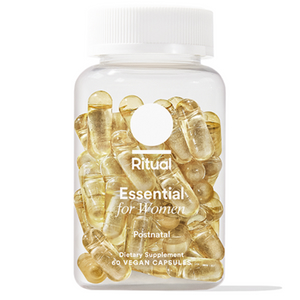
8.0
Quality
7.5
Support Research
8.5
Reputation
9.0
Price
Features
- Safe to consume postnatal supplements
- Vegan, Gluten-free, dairy-free
- Free from major allergens
- Non-genetically modified organism (GMO)
- No artificial additives, colorings, and preservatives
- Delayed-release capsule design
- Contains 15 traceable ingredients
Brand Information
- Focus on promoting healthy habits
- Bridge common nutrient gaps
Medical Benefits
- Proper brain development and function in infants
- Maintain proper nutrient levels in lactating mothers
About The Brand
Ritual is a company that offers a wide range of multivitamins that you can order online. They also have a variety of protein powders. The good news is these products are available for people of all ages and at different stages of life.
Transparency is one area that Ritual focuses on when releasing multivitamins and protein powders to the market. Each product comes with a detailed ingredient list that also includes percentages of each ingredient.
Also, all products from Ritual undergo thorough third-party testing to ascertain good quality. Tests check for heavy metals and contaminants and give out a detailed report. Such details make Ritual products safe to consume, including their postnatal multivitamin.
All multivitamins, including Ritual postnatal, use delayed-release capsules[1]. These are designed to dissolve in the intestines instead of the stomach. This improves how the body absorbs nutrients, in the small intestines (“bioavailability”), since digestion in the stomach can be destructive to them.
Top Ritual Products In April 2024
- Gut Health Synbiotic+ – Best For Gut Health
- Multivitamin for Women 50+ – Best Traceable Multivitamin
- Multivitamin for Men 18+ – Best Multivitamin For Men
- Prenatal Multivitamin – Best Multivitamin For Prenatal Women
- Daily Shake 18+ – Best Protein Shake
The Line Up At A Glance
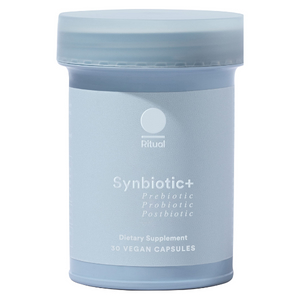
Best For Gut Health
Gut Health Synbiotic+
- Probiotic blend supplements
- Vegan-gluten and major-allergen free
- Third-party tested gut supplements
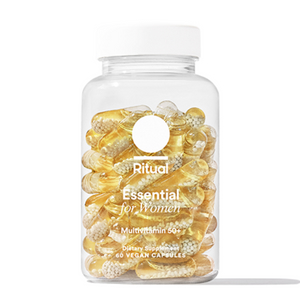
Best Traceable Multivitamin
Multivitamin for Women 50+
- Vegan, gluten and major allergen free
- Contains verifiableable ingredients
- No artificial colorants
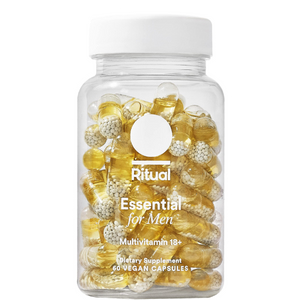
Best Multivitamin For Men
Multivitamin for Men 18+
- Contains essential macronutrients
- Special blend for men 18+
- Gluten and major allergen free
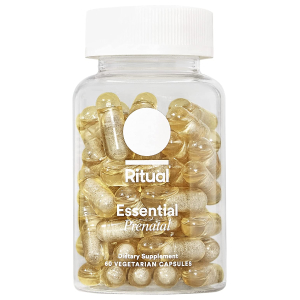
Best Multivitamin For Prenatal Women
Prenatal Multivitamin
- Provides Omega-3 DHA
- Contains 12 key nutrients
- Non-GMO project verified
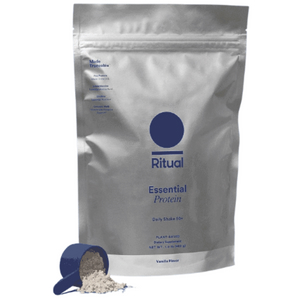
Best Protein Shake
Daily Shake 18+
- Verifiable plant-based protein
- Provides 20g of protein
- Contains 150mg Choline
What Is Ritual Postnatal Multivitamin?
Ritual Postnatal Multivitamin is a women’s postnatal multivitamin. This is essential for women to support normal immune function. This multivitamin comes in a delayed-released capsule and contains 15 beneficial ingredients.
Nutrient demands are high for postnatal women[2] after delivery. Hormonal levels are affected while in the postnatal period. The capsule contains key ingredients and postnatal vitamins designed for lactating women.
Ritual Postnatal Multivitamin is safe to use for postnatal women after giving birth. Continue to use the postnatal multivitamin for six months while producing breast milk.
Feature Product & Coupon

Best Reputation
Ritual Postnatal Multivitamin
- Safe to consume postnatal supplements
- Vegan, Gluten-free, dairy-free
- Free from major allergens
- Non-genetically modified organism (GMO)
- No artificial additives, colorings, and preservatives
- Delayed-release capsule design
- Contains 15 traceable ingredients
Does Ritual Postnatal Multivitamin Really Work?
Ritual Multivitamin works since it contains 15 verifiable ingredients that are essential vitamins and minerals that lactating mothers need. This verification method is an industry protocol called “traceability,” and such ingredients are said to be “traceable.”
As milk production amps up, the level of nutrients can drop, but this is easy to solve by taking Ritual Postnatal Multivitamin capsules.
Is Ritual Postnatal Multivitamin Safe?
Ritual Postnatal Multivitamin is safe for moms to consume after giving birth. The multivitamins undergo third-party testing done by an independent lab.
They test for identity, strength, purity, and composition. They also test for heavy metals, allergens, microbes, and contaminants.
Pros
- Safe to consume postnatal supplements
- Ritual offers free shipping
- Vegan postnatal supplements
- Gluten-free, dairy-free
- Free from major allergens
- Non-GMO
- No artificial additives, colorings, and preservatives
- Delayed-release capsules
- Money-back guarantee by Ritual
- Contains 15 traceable ingredients
Cons
- Lacks some essential micronutrients
- Can lead to acne flare-up
Ritual Postnatal Multivitamin Ingredients
Ritual Postnatal Multivitamin contains 15 traceable ingredients in variable recommended daily values (DV). These include vitamin A (38%), vitamin C (21%), vitamin D3 (333%), vitamin E (53%), folate (167%), vitamin B12 (357%), biotin (429%), choline (10%), iron (30%), iodine (69%), magnesium (8%), zinc (23%), boron, omega-3 fatty acid and vitamin K12.
Other ingredients include stomach-acid-resistant outer vegan capsule materials, inner vegan capsule, cellulose, silica, and l-leucine.
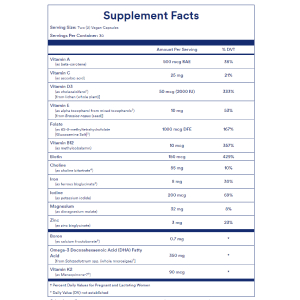
Vitamin A
Women need to take prenatal and postnatal multivitamins. Ritual Postnatal Multivitamin is a good choice since it contains beneficial ingredients for lactating women. Among the key ingredients is vitamin A.
When pregnant, women are always reminded to take prenatal multivitamins. This ensures they have all the essential vitamins to support the pregnancy and for normal immune function. After giving birth, it’s time to start taking postnatal vitamins that have vitamin A.
When you take delayed-release capsules with vitamin A, your baby benefits from your breast milk. Vitamin A[3] is good for vision, immune function, and healthy organ tissues. Lactating women ensure their babies get vitamin A when they consume breast milk.
At birth, colostrum[4] has ample vitamin A that benefits your baby. However, its dense consistency tends to drop after 2 to 3 weeks. However, taking vitamin supplements can ensure your baby still gets vitamin A from breast milk.
Vitamin C
It’s important and safe to take vitamin C when breastfeeding. This is another ingredient available in the Ritual Postnatal Multivitamin. These postnatal vitamins contain 21% of DV of vitamin C, which is essential for normal immune function.
Apart from better immune function, vitamin C is also good for collagen production. While vitamin C is good for babies, they shouldn’t consume vitamin supplements. Instead, a good source of vitamin C is breast milk from a lactating mother.
Therefore, when you consume Ritual Postnatal with vitamin C, your baby gets essential nutrients from breast milk. Your baby needs to get enough vitamin C in its body. Vitamin C deficiency can lead to health issues like digestive dysfunction and neurodevelopmental disorders.
Always talk with a physician to determine if there is a vitamin C deficiency before taking action and know that good food rich in vitamin C and Ritual supplements can ensure good amounts of vitamin C in breast milk.
Vitamin D3
Ritual Postnatal Multivitamins contain vitamin D3, an essential nutrient for mom and baby. The multivitamin company adds vegan-certified vitamin D3 from lichen.
Vitamin D3 is good for prenatal and postnatal moms because it is a critical nutrient in breast milk.
Vitamin D3 is important for babies. A deficiency of this nutrient can lead to health conditions like rickets[5]. Rickets affects bone health and can lead to soft bones in babies. If a baby continues to grow with a vitamin D deficiency, it can develop bow legs, a soft skull, or other skeletal deformities.
There are different sources of vitamin D3. Among the main ones is breast milk, especially the colostrum immediately after giving birth. Also, the sun is another great source of vitamin D, so spending time in the sun is recommended.
Babies below 6 months of age get a huge percentage of vitamin D[6] when breastfeeding. The recommendation is 600 IU per day for lactating women. This plays an essential role in immune function and bone health for babies.
Vitamin E
Vitamin E is an essential nutrient for prenatal and postnatal women. It’s also a crucial nutrient for babies and child development. This essential fat-soluble micronutrient is available in Ritual Postnatal Multivitamins taken by moms after giving birth.
Breast milk is a good source of vitamin E[7] for babies. It acts as an essential anti-oxidant for babies and small children. This protects cells in the body from damage by free radicals. Free radicals can lead to different health conditions like cancer and heart disease.
Vitamin E is important as a prenatal vitamin since it promotes proper baby development. A vitamin E deficiency[8] can lead to premature babies. Apart from that, you also risk giving birth to a baby with malabsorption, which affects how they will absorb fat-soluble vitamins.
A breastfeeding mom who takes Ritual Postnatal Multivitamins ensures their baby gets enough vitamin E. Nutrient demands are high at this stage for mom and baby, so taking Ritual supplements is beneficial.
Choline
Choline is part of the vitamin B complex and one of the essential nutrients. The human body needs choline, but it may require supplementation to get the right amount. The main source of Choline is in the diet. However, you also can take Ritual vitamins that have choline.
Babies need choline during crucial developmental stages. This is why moms are encouraged to take prenatal and postnatal multivitamins. Choline is an essential nutrient for a baby’s brain development[9] and activity. Also, the nutrient plays a critical role in cell membrane formation.
Babies and children under 5 years need choline since this is a crucial developmental stage. The good news is when you take Ritual Postnatal Multivitamins, your baby gets additional choline from breast milk[10].
Taking nutritional supplements is especially important for vegans who don’t consume animal products. They run a higher risk of having a choline deficiency which can affect their baby’s health and well-being.
Magnesium
Ritual multivitamin contains 8% DV of magnesium, an essential nutrient for mom and baby. Babies can get all the magnesium they need from breast milk. This works well when you want to exclusively breastfeed your baby. It also has laxative effects if a woman has constipation from dehydration in the postpartum period.
Magnesium is an essential dietary nutrient that babies need for proper development[11]. This is what the body needs to activate vitamin D and calcium. Calcium promotes the contraction of muscles, and magnesium is key to proper muscle function.
A healthy amount of magnesium and calcium in the body ensures proper muscle function. It also plays a role in a proper heartbeat rhythm and proper immune function. Also, you might be happy to know magnesium can help your baby relax and sleep better[12].
Other Ingredients
Folate
Folate is another ingredient in Ritual Postnatal Multivitamin. Folate is the folic acid that babies need for proper brain development[13] and spine formation.
Biotin
Ritual Postnatal Multivitamin contains biotin that babies get from breast milk. Biotin[14] is important because it plays a crucial role in breaking down food. This promotes normal energy-yielding metabolism in babies.
Zinc
In this Ritual Postnatal review, we touch on all ingredients in this multivitamin, which includes zinc, another essential nutrient that babies need for proper development and immune function[15].
Alternatives To Ritual+
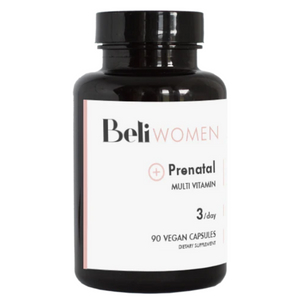
Beli Women
15% Off Coupon: HEALTHCANAL
- Prenatal and postnatal multivitamin
- Good for mom and baby
- Gluten and allergen-free
- Only available from the company website
- Can cause constipation
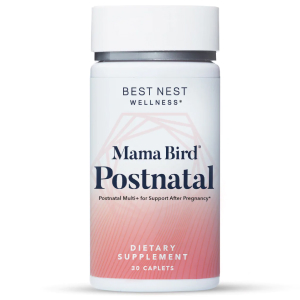
Best Nest Wellness
- Good for brain development
- Third-party tested prenatal and postnatal multivitamins
- Gluten-free and non-GMO
- Expensive vitamin supplement
- Can cause headaches
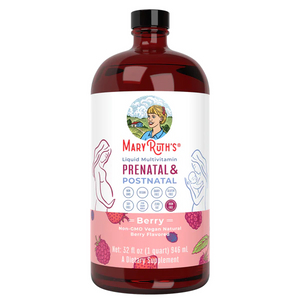
Mary Ruth’s
- Organic wide range of products
- 24/7 customer support
- 100% money-back guarantee
- Can cause diarrhea
- Can cause nausea and vomiting
Health Benefits Of Ritual Postnatal Multivitamin
Lactating moms have a high nutrient demand. They not only need nutrients for their bodies but also for the baby. Babies get nutrients from breast milk until they start eating food. Exclusively breastfeeding[16] puts a high demand on the mom for nutrients, hence the need for postnatal multivitamins.
Ritual Postnatal Vitamins contain 15 crucial ingredients that moms need for better milk production. As milk production increases, babies can enjoy breast milk’s additional nutrients.
When you read the Ritual Postnatal Multivitamin reviews, you can see the company focuses on quality. All the vitamins and minerals are essential for a baby’s development–prenatal and postnatal (postpartum).
Eating healthy can boost milk production to increase milk supply. Adding Ritual Multivitamins ensures the milk benefits your baby. Both help prevent a vitamin or nutrient deficiency[17] that can cause health and developmental concerns for babies.
Dosage
Ritual Postnatal Multivitamin is good for moms who’ve given birth and are breastfeeding. You can take 2 capsules per day.
Ritual Multivitamins come in a delayed-release capsule that facilitates better nutrient absorption in the body. Instead of nutrient release in the stomach, it takes place in the small intestine, resulting in better bioavailability.
Ritual Postnatal Multivitamin Reviews: What Do Real Users Say?
“I’ve been taking my Ritual vitamin for FOUR YEARS! I can tell you that I feel my best, and I love this multivitamin! It has never made me sick, and I mostly take it without food. It has been a part of my morning routine, and I love that it’s two capsules a day! Btw they smell amazing! I have gotten my sisters and friends to try it as well. They even switched to the prenatal when they got pregnant and never got sick from taking it!”
Olivia
“I tried a few different vitamin brands and never felt like they do anything. I had an instant change with Ritual and I never plan on using anything else.”
Charlotte
“The only subscription I have are these vitamins, which says a lot. It allows me to commit to staying healthy. There is thought behind every ingredient and the brand’s focus on transparency is appreciated. I wasn’t a fan of mint flavor at first, but I assume it would musk anything else. What I like is that it’s one of the few multis that include iron.”
Emily
“When I first tried these I hated them. The taste was awful fish. But then I tried taking just one a week before eating anything. Now I have no issues with the taste and feel much better. ”
Michelle
“I just got my bottle today which was a little damaged but that’s fine with me. I just obviously started taking them today and will post another review in a month or so.”
Claire
Final Thought: Is Ritual Postnatal Worth Buying?
Ritual Postnatal Multivitamin is worth buying, especially for new moms. There’s an increase in nutrient demand when you conceive. This is why you should take prenatal multivitamins that benefit the mom and baby.
After you deliver, your milk production is crucial for your baby’s health and well-being. Taking Ritual Postnatal Multivitamin ensures your baby gets all essential vitamins and minerals. These play a crucial role in developing different parts of their bodies, including the brain and bones. Always consult your doctor/dietitian before taking the supplements.
Frequently Asked Questions
Ritual Postnatal Multivitamin contains 15 essential ingredients. In DV%, these are vitamin A (38%), vitamin C (21%), vitamin D3 (333%), vitamin E (53%), folate (167%), vitamin B12 (357%), biotin (429%), choline (10%), iron (30%), iodine (69%), magnesium (8%), zinc (23%), boron, Omega-3 Fatty Acid and vitamin K12.
Prenatal means before birth, and postnatal refers to after birth. Prenatal multivitamins are specifically designed to benefit moms and support the pregnancy and baby’s growth before birth. Postnatal multivitamins are formulated to help with healing and making breastmilk nutrient-rich after birth.
Ritual Postnatal does have vitamin D that babies get from breast milk. Babies below 6 months get a huge percentage of Vitamin D[6] when breastfeeding. The recommendation is 600 IU per day for lactating women. This plays an essential role in immune function and bone health for babies.
Ritual Postnatal Multivitamin contains 350mg of docosahexaenoic acid (DHA) per dose. Babies need this important nutrient for proper brain development[18], visual acuity, and function. DHA is also good for moms because it supports healthy brain function in adults.
There are 30 servings of Ritual Postnatal supplements in a bottle. When taking 2 per day, the supplements will last you 15 days.
+ 18 sources
Health Canal avoids using tertiary references. We have strict sourcing guidelines and rely on peer-reviewed studies, academic researches from medical associations and institutions. To ensure the accuracy of articles in Health Canal, you can read more about the editorial process here
- Rump, A., Weiss, F.N., Schulz, L., Kromrey, M.-L., Scheuch, E., Tzvetkov, M.V., White, T., Durkee, S., Judge, K.W., Jannin, V., Bellamine, A., Weitschies, W. and Grimm, M. (2021). The Effect of Capsule-in-Capsule Combinations on In Vivo Disintegration in Human Volunteers: A Combined Imaging and Salivary Tracer Study. Pharmaceutics, [online] 13(12), p.2002. doi:10.3390/pharmaceutics13122002.
- Aparicio, E., Jardí, C., Bedmar, C., Pallejà, M., Basora, J. and Arija, V. (2020). Nutrient Intake during Pregnancy and Post-Partum: ECLIPSES Study. Nutrients, [online] 12(5), p.1325. doi:10.3390/nu12051325.
- Medlineplus.gov. (2022). Vitamin A: MedlinePlus Medical Encyclopedia. [online] Available at: https://medlineplus.gov/ency/article/002400.htm
- Y. de Vries, J., Pundir, S., Mckenzie, E., Keijer, J. and Kussmann, M. (2018). Maternal Circulating Vitamin Status and Colostrum Vitamin Composition in Healthy Lactating Women—A Systematic Approach. Nutrients, [online] 10(6), p.687. doi:10.3390/nu10060687.
- Balasubramanian, S. (2011). Vitamin D deficiency in breastfed infants & the need for routine vitamin D supplementation. The Indian journal of medical research, [online] 133(3), pp.250–2. Available at: https://www.ncbi.nlm.nih.gov/pmc/articles/PMC3103147/
- Delavar, M., Karimian, P., Ebrahimi, H. and Jafarnejad, S. (2022). Effects of vitamin D on bone density in healthy children: A systematic review. Journal of Family Medicine and Primary Care, [online] 11(3), p.870. doi:10.4103/jfmpc.jfmpc_2411_20.
- Lima, M.S.R., Dimenstein, R. and Ribeiro, K.D.S. (2014). Vitamin E concentration in human milk and associated factors: a literature review. Jornal de Pediatria, [online] 90(5), pp.440–448. doi:10.1016/j.jped.2014.04.006.
- Hatfield, E., Garlitz, K., Westgate, P., Bada, H. and Gomez-Pomar, E. (2017). Vitamin E in the Preterm Infant: A Forgotten Cause of Hemolytic Anemia. American Journal of Perinatology, [online] 35(03), pp.305–310. doi:10.1055/s-0037-1607283.
- Cornell Chronicle. (2022). Choline makes key nutrient available for baby development | Cornell Chronicle. [online] Available at: https://news.cornell.edu/stories/2022/05/choline-makes-key-nutrient-available-baby-development
- Wiedeman, A., Whitfield, K., March, K., Chen, N., Kroeun, H., Sokhoing, L., Sophonneary, P., Dyer, R., Xu, Z., Kitts, D., Green, T., Innis, S. and Barr, S. (2018). Concentrations of Water-Soluble Forms of Choline in Human Milk from Lactating Women in Canada and Cambodia. Nutrients, [online] 10(3), p.381. doi:10.3390/nu10030381.
- Fanni, D., Gerosa, C., Nurchi, V.M., Manchia, M., Saba, L., Coghe, F., Crisponi, G., Gibo, Y., Van Eyken, P., Fanos, V. and Faa, G. (2020). The Role of Magnesium in Pregnancy and in Fetal Programming of Adult Diseases. Biological Trace Element Research. [online] doi:10.1007/s12011-020-02513-0.
- Abbasi, B., Kimiagar, M., Sadeghniiat, K., Shirazi, M.M., Hedayati, M. and Rashidkhani, B. (2012). The effect of magnesium supplementation on primary insomnia in elderly: A double-blind placebo-controlled clinical trial. Journal of research in medical sciences : the official journal of Isfahan University of Medical Sciences, [online] 17(12), pp.1161–9. Available at: https://www.ncbi.nlm.nih.gov/pmc/articles/PMC3703169/
- Naninck, E.F.G., Stijger, P.C. and Brouwer-Brolsma, E.M. (2019). The Importance of Maternal Folate Status for Brain Development and Function of Offspring. Advances in Nutrition, [online] 10(3), pp.502–519. doi:10.1093/advances/nmy120.
- Patel, D.P., Swink, S.M. and Castelo-Soccio, L. (2017). A Review of the Use of Biotin for Hair Loss. Skin Appendage Disorders, [online] 3(3), pp.166–169. doi:10.1159/000462981.
- citeseerx.ist.psu.edu. (n.d.). Download Limit Exceeded. [online] Available at: https://citeseerx.ist.psu.edu/viewdoc/download?doi=10.1.1.574.2204&rep=rep1&type=pdf.
- Dieterich, C.M., Felice, J.P., O’Sullivan, E. and Rasmussen, K.M. (2013). Breastfeeding and Health Outcomes for the Mother-Infant Dyad. Pediatric Clinics of North America, [online] 60(1), pp.31–48. doi:10.1016/j.pcl.2012.09.010.
- Leaf, A.A. (2006). Vitamins for babies and young children. Archives of Disease in Childhood, [online] 92(2), pp.160–164. doi:10.1136/adc.2006.109066.
- HORROCKS, L.A. and YEO, Y.K. (1999). HEALTH BENEFITS OF DOCOSAHEXAENOIC ACID (DHA). Pharmacological Research, [online] 40(3), pp.211–225. doi:10.1006/phrs.1999.0495.



